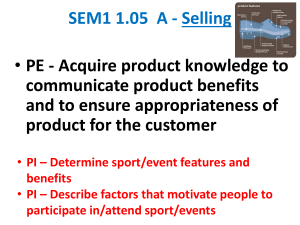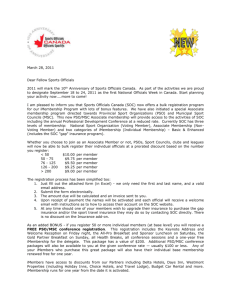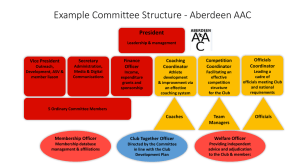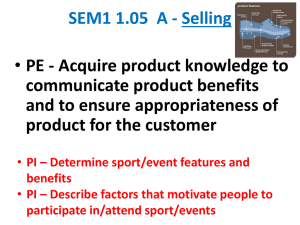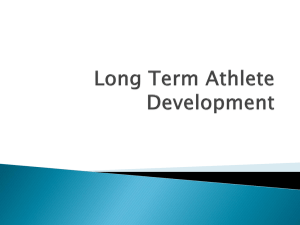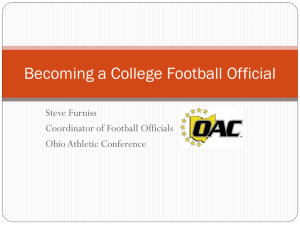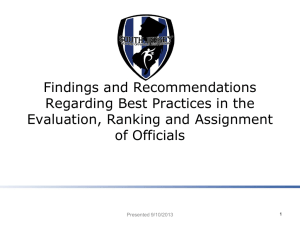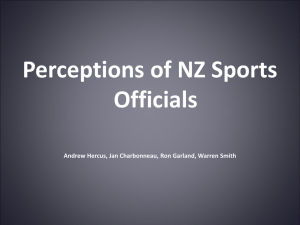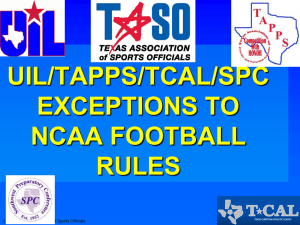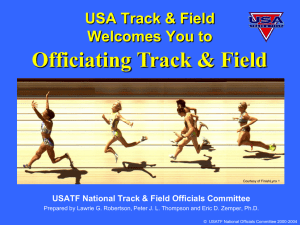LTOD (Charles Cardinal)
advertisement
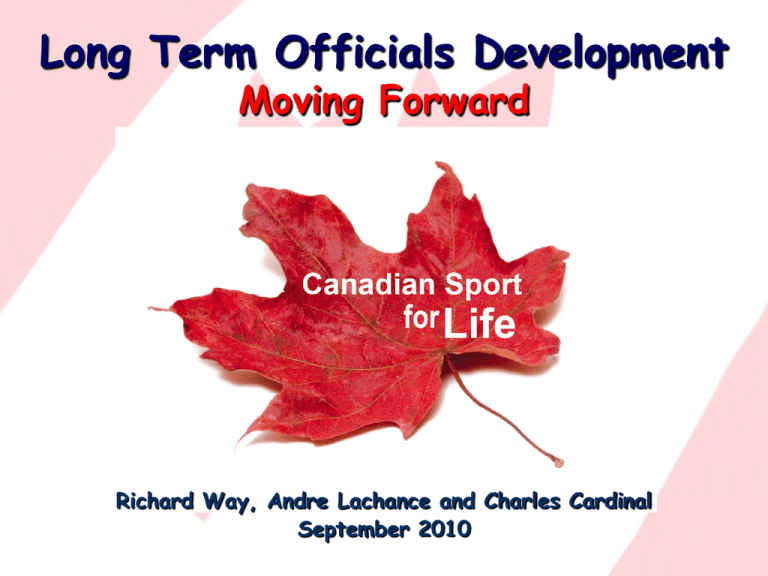
Long Term Officials Development Moving Forward Richard Way, Andre Lachance and Charles Cardinal September 2010 People change, Sports change Goals change, Rules change, Officiating changes Le sport est vital du mieux-être des Canadiens et Canadiennes Chaque enfant est un athlète Un pays, une vision, un système Sport is a vital to the wellness of Canadians. Every child is an athlete One country, one vision, one system Canadian Sport Policy (2002) Politique canadienne du sport (2002) Four Policy Goals Enhanced Excellence Enhanced Participation Quatre objectifs Excellence accrue Participation accrue Enhanced Capacity Ressources accrues Enhanced Interaction Interaction accrue Conférence des ministres FPT (2004-2005) FPT Ministers’ Conference (2004-2005) The Three Key Outcomes LIFELONG PARTICIPATION IMPROVED PERFORMANCE PHYSICAL LITERACY World Obesity “Because of the increasing rates of obesity, unhealthy eating habits, and physical inactivity, we may see the first generation that will be less healthy and have a shorter life expectancy than their parents.” US Surgeon General 2004 “The definition of insanity is doing the same thing over and over again and expecting different results.” Albert Einstein What is LTAD (Sport for Life)? • Optimal training, competition and recovery programming with relation to biological development and maturation How old is a 13 year old ? What is LTAD (Sport for Life)? • Athlete centred, coach driven and administration, sport science and sponsor supported 14 14 What is LTAD (Sport for Life)? • Equal opportunity for recreation and competition • Training and competition is based on chronological age (while athletes can be 4 - 5 years apart by maturation levels) Wave 1 Vague 1. Athletics - Athlétisme 2. 3. 4. 5. Baseball Biathlon Cross Country - Ski de fond Freestyle ski acrobatique 6. Golf 7. 8. 9. 10. 11. 12. Judo Speed Skating - Patinage de vitesse Surf des neiges - Snowboard Synchro Rowing - Aviron Triathlon 13. Volleyball Wave 2 Vague Alpine Ski Alpin 14. Water Ski & 1. Wakeboard - Ski Cerebral Palsy sports nautique et 2. planche 3. Cycling - cycliste 4. Canoe - canotage 5. Curling 6. Diving - plongeon 7. Equine – Hippique 8. Gymnastics - Gymnastique 9. Rugby 10. Softball Wave 3 Vague 1. Basketball 2. 3. 4. 5. 6. 7. 8. 9. 10. 11. 12. 13. 14. 15. Archers - des archers Weightlifting - d’haltérophilie Bobsleigh, Skeleton, Luge Field Hockey - Hockey sur gazon Figure Skating - Patinage Football Hockey Karate - karaté Lacrosse - de crosse Racquetball Ringette - Ringuette Taekwondo Squash Water Polo Wave 4 Vague 1. Badminton 2. Bowling - des quilles 3. Boxing - Boxe 4. Broomball - Ballon sur glace 5. Cricket 11. Soccer 6. Fencing - d’escrime 12. Swim - Natation 7. Goalball 13. Wheelchair Rugby en fauteuil roulant 8. Lawn Bowling - Boulingrin 14. Wrestling - Lutte 9. Shooting - de tir 15. Yachting 10. Sport Parachute - parachutisme sportif 11. Table Tennis - Tennis de table 12. Tennis Basketball Long-term Player/Athlete Development Model (draft) Lots of sports, Tons of officials, Plethora of development programs LTOD Building the Future • Where do we want to be in 2018? Grassroots Recreational Stream Competitive Stream High Performance Stream Sports actually involved in the LTOD Process Hockey Ringette Baseball Others ??? Guiding Principles? • Excellence • Needs-based - addresses the needs of umpires and of all the other participants • Flexibility - adaptable to the needs of participants and changes in the game • Inclusivity - based on equal opportunity • Collaborative LTOD Goals? • Improve the quality of officiating at every level • Develop uniformity and consistency throughout the country • Educate parents and fans on the work of the Officials Adapted from Claude Frappier, arbitre en chef, région Richelieu LTOD Goals? • Offer a tutorship / mentorship program to complement the course • Develop uniformity in the interpretation of the rules, their implementation, the positioning of officials on the ice / situation and the visual signals to communicate Adapted from Claude Frappier, arbitre en chef, région Richelieu LTOD Goals? • Acquire / Consolidate / Refine and Maintain optimal officiating performance at every game Requires: Skill proficiency Conditioning Ideal performance state preparation (mental) adapted from Claude Frappier, arbitre en chef, région Richelieu LTOD Goals? Focus on improving performance, not punishing failure. Developing Competencies? • Need to know? • Be able to do? • How to behave? Developing Core Competencies (Skills)? • • • • • • Mental toughness Emotional intelligence Physically fit Decision-making Game management Interpersonal skills – In competition – Outside competition A Core Competencies? • • • • • • Continuous improvement Ability to adapt Always learning Open to change Open to sharing Open to work together LTOD Key Components? • Training education, development – Competency based training and outcomes – Official Practice • Pathways – Different strokes for different folks – adaptable & flexible – Community, Competitive, Developmental, Professional – context based • Personnel – Recruitment – Retention LTOD Key Components? • Excellence always (quality assurance) – Define what is Excellence in officiating at every level – Meeting needs of officials – Meeting needs of other stakeholders – Ensuring (verification) – Continuous improvement (kaizen) • Leadership & organization – Corporate driven Current issues? Interactive section: At your table determine your top 3 current issues… Current issues Retaining sports officials is a vital component in maintaining levels of participation in organised sports. Abuse and harassement are not the only reasons why number of sports officials are declining. Current issues Inexperienced officials at the grass roots level of sport and lack of strategies to retain officials Resources devoted by NSO/PSO/Sport Canada/Prov. Gov. to sports officiating are disproportionally low compared to coach and athlete development Current issues There is an underlying assumption that all sports officials are seeking career advancement and this is not necessarily the case. Education of coaches (and parents) regarding the goals of the officials. Current issues Officials are disconnect from the rest of the sport – organization. Others Current issues Interactive section: Apply current issues to LTAD stages… Key Factors Interactive section: What are the keys factors in LTOD? Can you be specific to LTAD stages… FUNdamentals Physical Literacy Specialization Age Developmentally Appropriate Trainability Readiness Periodization Planning It Takes Time Rule of 10 (10,000 hrs) Kaizen Competition Working Together System Integration To Consider ? • • • • Research shortcomings? Applying LTOD 10 key factors? Stages of development? or contexts? Officials background. What do we know about officials in Canada ? • Ensuring the culture in a sport respects and understands officials and training of officials. Potential Initiatives • Encourage NSO National program (including database) • Competency-based training • Matrix of skills – holistic development • Use of on-line training systems • National grassroots program (including recruitment partner) • MultiSport relationships Potential Initiatives • Officials technical directors – not just supervisors • Development opportunities (including tournament roles) • Standardize training / administrative systems • Physical preparation of officials • Sports-Études/Academies for officials What got you here… Won’t get you there…
